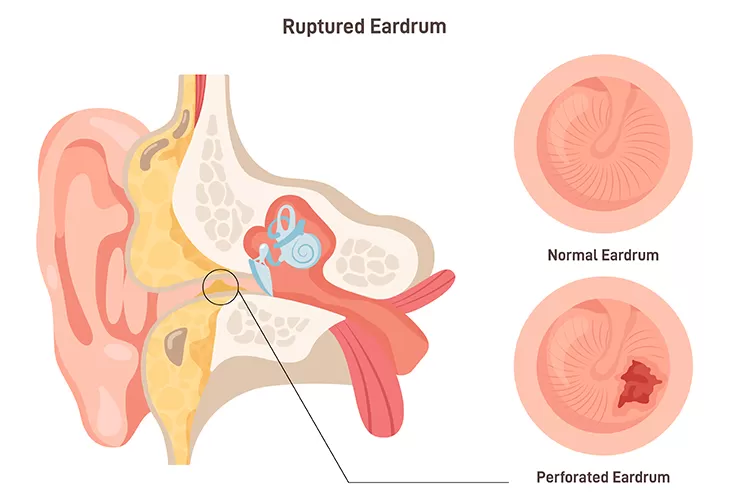Eardrum Perforation

Eardrum Perforations: Causes, Symptoms, and Treatment Options
Experiencing sharp ear pain or hearing loss? Learn about the symptoms, causes, and treatments for eardrum perforations from Pinnacle ENT.
Eardrum perforations, also commonly known as ruptured eardrums, can be extremely painful and lead to complications such as hearing loss and an increased risk of infection. Typically the result of trauma or infection, eardrum perforations can significantly impact your quality of life.
What is the Eardrum?
The tympanic membrane, more commonly known as the eardrum, is a thin layer of tissue that separates the ear canal from the middle ear. It plays a crucial role in hearing by vibrating in response to sound waves collected from the environment. These vibrations are then translated into nerve impulses by structures in the middle and inner ear, allowing you to perceive sound.
In addition to the role it plays in hearing, the eardrum also functions as a protective barrier, keeping the delicate parts of the middle ear safe from water, bacteria, and other foreign substances.
What Happens When the Eardrum Ruptures?
Whenever there is a hole or tiny tear in the eardrum, the loss of integrity can have severe consequences, including:
- Hearing Loss: Perforations limit the eardrum’s ability to vibrate, which can lead to partial or complete hearing loss in the affected ear.
- Increased Risk of Infection: The hole in the eardrum allows bacteria to enter the middle ear, increasing the risk of infection.
Understanding these implications is essential for seeking timely treatment and preventing further complications.
What Causes a Ruptured Eardrum?
Ruptured eardrums can have several causes and factors, each of which can compromise the integrity of the tympanic membrane.
Common Causes of Eardrum Perforations:
- Infections: Middle ear infections can create pressure buildup behind the eardrum, leading to rupture.
- Injury: Any type of trauma to the head or the insertion of foreign objects into the ear (like cotton swabs) can cause the eardrum to tear.
- Eustachian Tube Disorders: Chronic issues with the Eustachian tube can weaken the eardrum, making it easier to puncture or perforate.
What Are the Symptoms of a Perforated Eardrum?
Recognizing the symptoms of a ruptured eardrum is critical for seeking and receiving the appropriate medical care. Symptoms may include:
- Sudden, sharp pain in the ear is often the first sign of a perforated eardrum.
- Fluid discharge that is bloody, clear, or even pus-like discharge from the ear can indicate an infection.
- Buzzing or ringing in the ear (tinnitus) is a common symptom following a rupture.
- Ear infections can also be a sign of rupture, which can cause pain, fever, or even discharge as it develops.
- Facial weakness or dizziness is a symptom indicating that the perforation might be affecting the nerves or balance mechanisms.
If you or someone you love is experiencing any of these symptoms, it’s essential to consult with a Pinnacle ENT specialist, as the condition can get worse over time.
How Can I Prevent a Perforated Eardrum?
While not all cases of perforated eardrum are preventable, there are some things you can do to reduce your risk.
Tips for Preventing Eardrum Perforations:
- Avoid inserting anything into your ears
- Seek prompt treatment for middle ear infections
- Protect your ears and hearing from loud noises
When Should I Seek Treatment?
If you’re experiencing any of the symptoms like pain and suspect that you have a ruptured eardrum, we encourage you to seek expert medical care. While some perforations can heal on their own, our highly trained ENT specialists can determine the underlying causes of your symptoms and help recommend the appropriate course of treatment.
Treatment Options:
- Non-Surgical Management: In cases where surgery isn’t required, treatment might involve pain management with over-the-counter medications, using warm compresses on the ear, and keeping the ear dry to promote healing.
- Surgical Intervention: If the perforation is severe or cannot heal on its own, surgery might be necessary to repair the damage.
At Pinnacle ENT, our specialists will work with you to develop a treatment plan that addresses your specific needs and helps you recover fully without developing complications.
A ruptured eardrum can be a painful and distressing condition, but you don’t have to face it alone. Our team at Pinnacle ENT is here to provide expert care and guide you through the recovery process. We’re committed to helping you regain your hearing from diagnosis to treatment. If you’re experiencing the symptoms of a perforated eardrum, contact us today to schedule an appointment so you can begin your journey to recovery.
Book Appointment